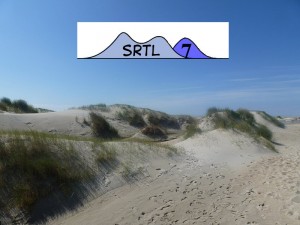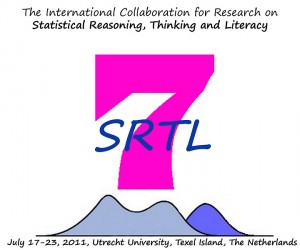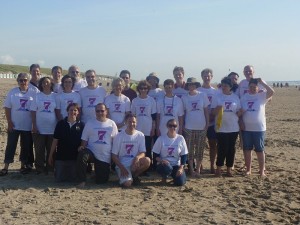| Date: | July 17-23, 2011 |
| Venue: | Freudenthal Institute for Science and Mathematics Education, Utrecht University, Texel Island The Netherlands |
| Theme: | New approaches to developing reasoning about samples and sampling in informal statistical inference. |
| Forum Coordinator: | Dani Ben-Zvi -University of Haifa, Israel Joan Garfield – University of Minnesota, USA |
| Local coordinator | Arthur Bakker (E-Mail: a.bakker4@uu.nl) |
Srtl7_final_announcement2011-07-01[2]
The First Announcement of SRTL-7
July 28, 2010
Dear Colleagues,
The International Collaboration for Research on Statistical Reasoning, Thinking, and Literacy (SRTL) would like to announce the seventh in a series of Research Forums to be held at Texel Island, the Netherlands, July 17-23, 2011. The Freudenthal Institute (http://www.fi.uu.nl/fisme/en/) at Utrecht University will host the Forum. This gathering offers a unique opportunity for a small, interdisciplinary group of researchers from around the world to meet for a short week to share their work, discuss important issues, and initiate collaborative projects. The topic of the seventh Forum will be New approaches to developing reasoning about samples and sampling in informal statistical inference. One outcome of the Forum will be a special issue or a book (to be decided later) summarizing the work presented, discussions conducted, and issues emerging from this and previous SRTL gatherings.
The SRTL Research Forums
The First International Research Forum on Statistical Reasoning, Thinking, and Literacy (SRTL-1) was held in Israel in July 1999. It has been followed by Forums in Australia (2001), USA (2003), New Zealand (2005), UK (2007), and Australia (2009). These Forums were co-chaired by Joan Garfield and Dani Ben-Zvi, with the help of local organizers Chris Reading (2001), Bill Mickelson and Ruth Heaton (2003), Maxine Pfannkuch and Chris Wild (2005), Janet Ainley and Dave Pratt (2007), and Katie Makar and Michael Bulmer (2009). Based on strong support from the participants and the statistics education community, SRTL has become an important biannual scientific event, complementary to large conferences. The Forums’ small size allows plenty of time for interaction and discussion. In inviting researchers for the Forum the scientific committee and co-chairs look for quality of the proposal and fit with the Forum theme, but also for a balance between ‘old-timers’ and new-comers, experienced and young researchers. It is therefore possible that key figures in the field will not be invited to the benefit of this balance or because their proposal does not fit as well as a new-comer’s proposal.
Theme of SRTL-7:New approaches to developing reasoning about samples and sampling in informal statistical inference
The Forum will build on the work discussed at previous SRTL gatherings on informal statistical inference. Recent research suggests it is important to study further the ideas and approaches related to reasoning about samples and sampling in the context of making informal statistical inferences. This topic is relevant at all levels of schooling, even in the early years.It is important that students understand samples and sampling, and their interrelationships with other key concepts in order to make statistical inferences (Garfield & Ben-Zvi, 2008). Two central ideas of sampling—sampling representativeness and sampling variability—are believed to be important foundations for understanding statistical inference. For example, Rubin, Bruce, and Tenney (1990) cautioned that overreliance on sampling representativeness leads students to think that a sample tells us everything about a population, while overreliance on sampling variability leads students to think that a sample tells us nothing useful about a population.Recently, several instructional sequences have been developed that focus on the use of simulations and dynamic visualizations to help students develop their understanding of sampling, modeling, and other statistical concepts (e.g., Konold & Kazak, 2008). Despite the development of flexible and visual tools, research suggests that showing students demonstrations of simulations using these tools will not necessarily lead to improved understanding and reasoning (Chance et al., 2007)The kinds of questions we will examine at SRTL-7 are formulated to lead to new approaches to understanding sampling issues in the context of making informal inferences rather than the traditional focus on sampling distribution and the Central Limit Theorem. We encourage qualitative and video-based research studies to be presented that address questions about learners at any level (university, workplace but with an emphasis on school) such as the following:
- How does reasoning about sample and sampling develop in the context of learning to make informal inferences from data?
- How are ideas related to sample and sampling used in making informal statistical inferences?}
- What are innovative and effective tasks, tools, or sequences of instructional activities that may be used to promote the understanding of reasoning about sample and sampling in making statistical inferences?
Philosophical, historical, and psychological contributions on the theme of the role of reasoning about sample and sampling in the context of making inferences are also welcomed.Expression of interest to attend the Forum have to be submitted before October 1, 2010 at http://srtl7.haifa.ac.il/. Forum attendance is by invitation because only a small number of scholars can be accommodated. Inquiries may be addressed to Arthur Bakker (a.bakker4@uu.nl).
References
Chance, B., Ben-Zvi, D., Garfield, J., & Medina, E. (2007). The role of technology in improving student learning of statistics. Technology Innovations in Statistics Education Journal, 1(1), Article 2. (http://escholarship.org/uc/item/8sd2t4rr)
Garfield, J., & Ben-Zvi, D. (2008). Developing students’ statistical reasoning: connecting research and teaching practice. New York: Springer.Konold, C., & Kazak, S. (2008). Reconnecting data and chance. Technology Innovations in Statistics Education, 2(1), Article 1. (http://escholarship.org/uc/item/38p7c94v
Rubin, A., Bruce, B., & Tenney, Y. (1991). Learning about sampling: Trouble at the core of statistics. In D. Vere-Jones (Ed.), Proceedings of the Third International Conference on Teaching Statistics (Vol. 1, pp. 314–319). Voorburg, The Netherlands: International Statistical Institute. (http://www.stat.auckland.ac.nz/~iase/publications/18/BOOK1/A9-4.pdf)
SRTL-7 Structure
The structure of this Research Forum consists of long interactive presentations (90 minutes) and short presentations (15 minutes) to the entire group of participants, interspersed with small group discussions. The SRTL convention is that all participants are expected to attend and contribute to discussion in all sessions, throughout the Forum, so please be sure that you will be available for the whole program. There will be a social program as well as opportunities for informal gatherings, conversations, and relaxation (beach, dunes, wood, and a swimming pool are all in walking distance from the hotel in which the gathering takes place).
There are three possible roles for participants in the Forum. The first role is to present your research on sampling in informal inferential reasoning in a long presentation (90 minutes) for those who can make a substantial contribution. The second role is to give a brief presentation (15 minutes), which is ideal for early career researchers doing research in this area or experienced researchers who intend to address a philosophical, historical, or psychological aspect of the theme. The third role is to be a discussant, which is suitable for experienced researchers and ‘old-timers’ in SRTL who do not have rich data to present themselves, but can stimulate others’ thinking on the topic.
If you wish to present your research or act as a discussant at SRTL-7, please submit online (http://srtl7.haifa.ac.il/) before October 1, 2010:
For presenters: a brief letter of introduction of yourself and a two-page overview of the work relevant to the theme of the Forum, at least addressing: introduction, literature review and/or theoretical framework, methodology, expected results, and your practical and theoretical contribution to the theme.
For discussants: a brief letter of introduction of yourself and qualifications for the discussant role. For discussants who have previously attended a SRTL Forum or are well known to the SRTL community this letter can be very brief, but a formal expression of interest is still required.When you submit your letter of introduction, you will be requested to fill an online form that includes your own name and contact details as well as those of a previous SRTL participant who knows you and your work, and has agreed to act as a reference.
The Scientific Committee will review the submissions before December 15, 2010, after which the co-chairs will soon inform interested researchers whether they are invited.All selected participants will be asked to prepare the first half of a research report summarizing the problem, literature, and methodology by May 15, 2011 to be read by all participants before the Forum. Based on the SRTL tradition, we suggest bringing carefully prepared video clips and/or written transcripts of classroom episodes or interviews to the Forum to illustrate what the researchers are learning about how students, teachers, professionals, or laypersons reason with the concepts of samples and sampling. Additional time will be set aside for optional collaborative analysis and discussion of video data.
VENUE AND TENTATIVE PROGRAM
Texel is the biggest of the Dutch Wadden islands, with a unique atmosphere due to its dunes and lighthouse, long and quiet beach, flora and fauna. It offers very pleasant walking and cycling paths as well as nice restaurants and child-friendly activities. The Wadden Sea, at the east of the island, was placed at the World Heritage list in 2009. All sessions will be held at the Pelikaan Hotel (http://www.depelikaan.nl/). Next to the hotel there are apartments, which are suitable for families. This hotel has a new part with nice rooms and conference rooms. The old part of the hotel offers cheaper rooms for those who prefer lower costs. A tropical swimming pool (Caluna) is in walking distance, just like the woods, dunes and the beach. We promote cycling to the excursion sites but provide alternative transport for those who cannot cycle. Ecomare, also in walking distance, is the main museum of this island, with seals and a bird recovery center. All participants are required to attend the entire Forum program. The program will begin on Sunday afternoon July 17, 2011 at 16:00. Meetings will take place through to Saturday July 23, 2011 at 13:00, interspersed with local excursions on the island. The Forum cost will be approximately €950 (about €650 for accompanying persons). Discount is possible for those who are willing to take a standard room (€890) or share a room (€800). Included in the Forum cost will be participants’ accommodation, meals, and local excursions. Bus rides from and to Schiphol airport will be organized provided enough delegates express interest in traveling together.
ORGANIZATION SRTL-7
Scientific Program Committee
Co-chairs:
Dani Ben-Zvi -University of Haifa, Israel
Joan Garfield – University of Minnesota, USA
Scientific Committee:
Janet Ainley – The University of Leicester, UK
Arthur Bakker – Utrecht University, The Netherlands
Bob delMas – University of Minnesota, USA
Katie Makar -The University of Queensland, Australia
Maxine Pfannkuch – University of Auckland, New Zealand
Andee Rubin – TERC, USA
The responsibility of the Scientific Committee is to consult with the co-chairs on details of the scientific program, and to review the proposals.
Local SRTL-7 Organizers
Arthur Bakker (Chair) – Utrecht University, The Netherlands
Adri Dierdorp, Jantien Smit – Utrecht University, The Netherlands.
The local organizers are responsible for organizing the program and social events, and facilitating the Research Forum.
| Please contact | For more information: |
| Arthur Bakker Utrecht University, The Netherlands a.bakker4@uu.nl |



